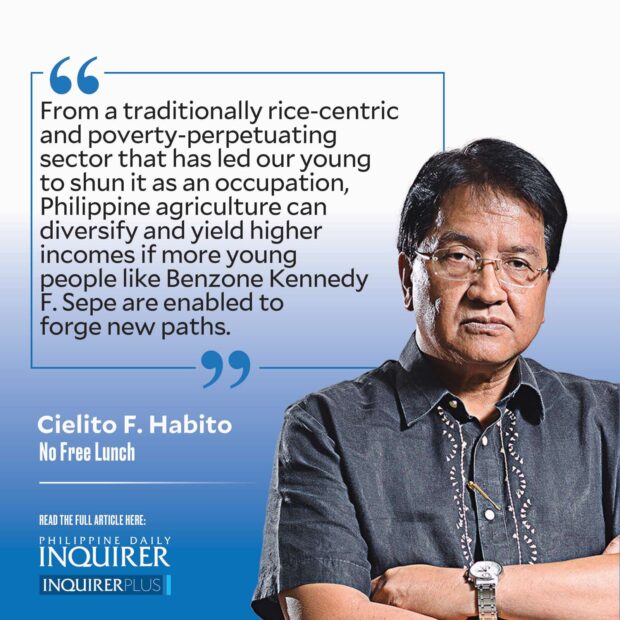When young people farm
I didn’t think apples could be grown in the Philippines until I visited an apple orchard in Barangay Kapatagan in Digos City, Davao del Sur, two weeks ago. It was part of work that has taken me all around the country to visit farmers, especially those who teach other farmers to improve their craft. Their farms serve as “learning sites for agriculture” (LSAs) accredited by the Agricultural Training Institute (ATI) under the Department of Agriculture, and are a crucial component in the nation’s agriculture and fisheries extension system. They are key to strengthening the country’s agriculture, fisheries, and forestry sector, which I’ve long described to be the backbone of the Philippine economy (see “The economy’s backbone,” 4/4/23).
While his apple orchard has yet to achieve commercial-scale production, 31-year-old farmer/vlogger Benzone Kennedy F. Sepe is showing how young people who think out of the box could, in due time, reshape our farm sector. From a traditionally rice-centric and poverty-perpetuating sector that has led our young to shun it as an occupation, Philippine agriculture can diversify and yield higher incomes if more young people like Benzone are enabled to forge new paths. He is growing and propagating not only apples, but other fruits like pears, raspberries, blueberries, figs, and many more that have earned his orchard ATI’s description as a “rare fruit farm and nursery” planted to hundreds of trees, and growing.
Article continues after this advertisementBenzone recounts how on a trip to South Korea in 2015, he was struck at how his hosts were successfully propagating tropical mangoes in their cold climate, using proper techniques and technology. So he thought, why not try growing temperate fruits in our own tropical setting? Even before that Korea trip, he had planted three seeds in his backyard from a Fuji apple bought from a supermarket. All three sprouted, but only one eventually survived—and that one lucky tree was the original source of the hundreds of trees he now has.
His strong interest and curiosity led him to enroll in a course in Agriculture Technology at the Davao del Sur State College (DSSC). As his interest grew further, he signed up for and earned a bachelor’s degree in agriculture. His creative and innovative mind easily gained him the favor and support of his mentors, who continue to help and encourage him to improve on his enterprise and crusade. With DSSC’s help to perform the standard Brix test for sweetness, he found his apples to have significantly higher sugar content than commercially available ones. He attributes this to our more abundant sunlight, which could also permit year-round fruit production here, unlike in temperate countries where winter limits them to one harvest per year. Having inspired many others to follow his lead, he is already doing good business selling planting materials, even as he sees commercial-scale fruit production to still be three to eight years away. By then, he expects to be selling apples by the thousands. And being the video techie that he is, he has gained nearly 29,000 subscribers and over 1.8 million views to his now 190 video blog posts—and as digital buffs would know, that translates to more income for him as well.
Apples could very well follow the same story grapes have had in the Philippines. In the early 1970s, domestically grown grapes were virtually unheard of, save for some very limited production in Cebu. My father was working in Thailand then, and as a college student who spent my vacations visiting my parents in Bangkok, I already saw significant local grape production in that country, and even got to visit a large grape farm there. It was around that time that the young Avelino Lomboy started propagating grapes as a hobby in Bauang, La Union, starting with 20 cuttings from Cebu. In less than a decade, his grape vineyard had grown to nearly a hundred hectares, and he has since been dubbed the Grape King and father of the grape industry in the Philippines. Lomboy Farms is now the best known in the industry, and is also a popular agritourism site that attracts thousands of grape pick-and-pay tourists in a month.
Article continues after this advertisementMeanwhile, in far-off Asuncion, Davao del Norte, 37-year-old Koys Magno Solteo and wife Rodillyn are also now popularizing grape production in their area. Their vineyard is an ATI-accredited LSA that is teaching others to grow the crop and helping further widen the industry in Mindanao. What clearly came through to me in our visit with him was the same innovative mindset that the late Avelino Lomboy exemplified, as he preached during his time to “plant something nobody else has planted.”
If many more of our youth take the cue from Benzone, Avelino, and Koys, there is hope for Philippine agriculture.

















